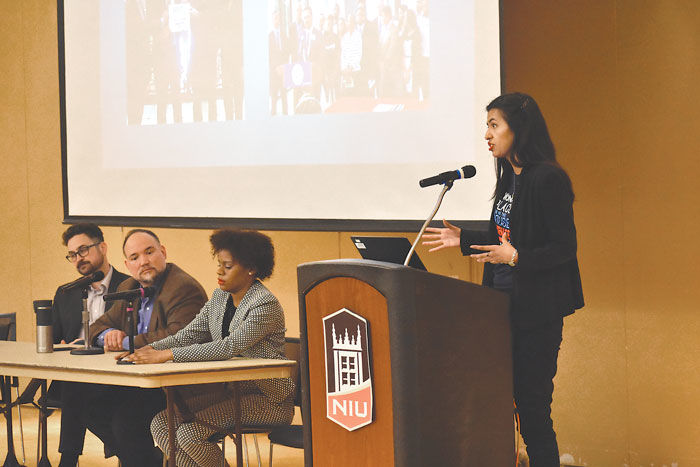Students have their voter questions answered
Erin Hernandez, Student Association director of Governmental Affairs, explains the importance of students engaging in elections, even at the university level.
March 8, 2018
The “Why Young People Don’t Vote” event held Wednesday explored what happens when young voters don’t enegage in their civic duty.
The event invited people from Dream Action NIU, NAACP and Illinois Public Interest Research Groups to emphasize the importance of voting, especially within the March 26 to 27 Student Association election and the March 20 primary elections. The event allowed attendees to receive feedback on ways they can promote voting within their communities.
Simón Weffer, associate professor and director of undergraduate studies for sociology, said increasing voter turnout could be as simple as giving employees and students the day off on election day.
“One way we can get increased younger members turning out to vote … is to say every election day is a day off because now the excuse of [having prior commitments] isn’t there,” Weffer said.
Weffer said political issues affect younger voters. He said young, eligible voters do not necessarily realize how much voting directly affects them until a major movement comes along and makes the connection easily recognizable.
Weffer said Gov. Bruce Rauner’s decision to cut higher education funding is the result of voters not researching the governor’s position.
Mylan Reeves, NAACP Political Action chairperson, said it is easy to complain about issues that are going on around campus and in local neighborhoods, but if the youth does not vote, there is nothing to complain about because it is that group of individuals’ choice who decide against participating in affecting change.
Reeves said there is a decreasing level of youngsters voting because there are no issues that are compelling them to vote.
“It just sounds nice,” Reeves said. “It looks good to go vote, everyone just says to go vote. But we don’t because these policies aren’t impacting this age group.”
Weffer said he disagreed because it’s important for young individuals to vote so senior citizens are not making policy decisions based on their experiences from when they were younger and the world was a diferent place.
Young voters need to realize the most effective movements do both “street mobilization and contesting through normal political channels,” Weffer said.
People don’t realize their vote impact. When an official is elected to each seat in the Illinois House and within the DeKalb City Council, he or she decides budget cuts and development planning, and that directly impacts society no matter the age, Weffer said.
De’chon Jones, senior business management major, asked how to address a problem where a lack of cohesion is prevalent. He said when there isn’t a sense of unity on a particular problem, the political system does not take that issue seriously.
“I think it’s important to recognize you have a shared self-interest and be very upfront and frank about that,and look for those opportunities but also not try to melt everything together,” said Abe Scarr, Illinois director of Public Interest Research Groups. “Cohesion is most powerful when there are people not always working together.”
Erin Hernandez, Student Association director of Governmental Affairs, said many people do not realize that the Student Association is the student government on campus. The Student Association makes the decisions regarding fees, funding and money prioritization, she said.
Hernandez said it is important to know what’s going on because of how fast policies are constantly evolving. She said it’s important for the younger generation to make changes instead of allowing the wrong representatives make the decision for young voters.
Naomi Bolden, sophomore political science major, said she votes because her household motivated her to exercise a right that has been fought hard for.
She said one of the major problems facing younger voters is a communication disconnect between them and political candidates.
“Government, politicians don’t really know how to communicate with of our age group,”Bolden said. “They don’t know what we care about. They know what’s affecting us, but they don’t know how to get that out there so we can understand that I should go out there because these issues do affect me directly.”
She said if candidates attempted to connect with younger voters and find a better way to relate to them, it’s possible voter turnout would be higher among the 18 to 24 age group.
It’s not that politicians don’t know how to talk to the younger age group, it’s that they don’t want to talk, Weffer said.
“They are being very deliberate about selectively being on social media or being in forms where the youth are,” Weffer said.







